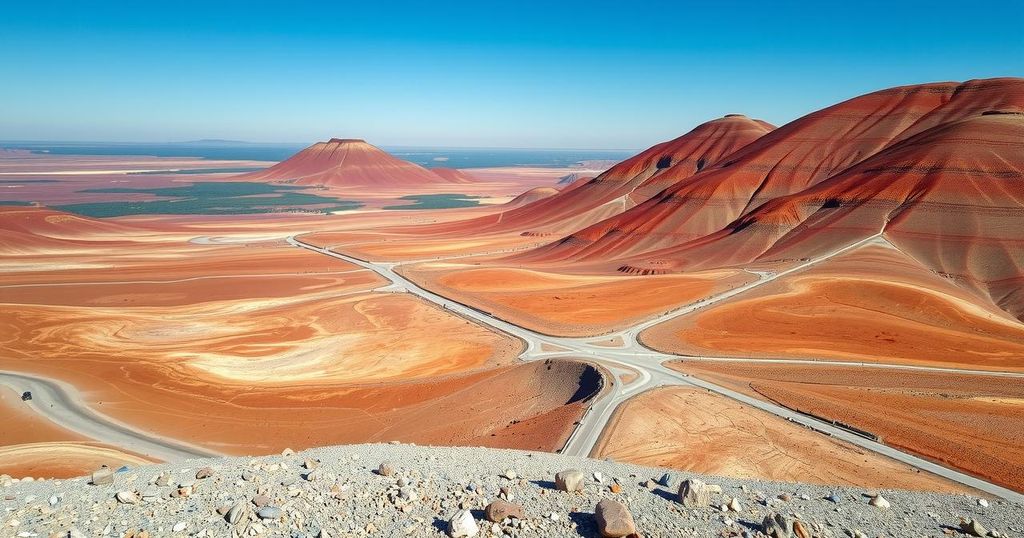Exploring the Democratic Republic of the Congo for Rare Earth Minerals

President Trump is now considering the Democratic Republic of the Congo (DRC) for potential deals on rare earth minerals after negotiations with Ukraine stagnated. The M23 rebel group has recently captured key cities in the DRC, emphasizing the region’s strategic mineral wealth necessary for high-tech products. Despite calls for a ceasefire with Rwanda’s government, the conflict continues to raise concerns about stability and economic exploitation in the DRC.
President Donald Trump is exploring opportunities within the Democratic Republic of the Congo (DRC) for potential deals on rare earth minerals. His focus has shifted from Ukraine, following stagnated negotiations with President Volodymyr Zelenskyy, to the DRC, a nation currently embroiled in conflict. The M23 rebel group has been engaged in prolonged fighting in eastern Congo and has recently regained significant ground, raising concerns about the region’s stability.
The DRC is rich in valuable minerals, essential for modern technology, particularly regarding electric vehicles and other high-tech products. Notably, it is a major source of coltan and cobalt, crucial components found in smartphones and the batteries of electric vehicles. Yinka Adegoke, Africa editor of Semafor, emphasized the economic motivations for the ongoing conflict, as the region is crucial for global mineral supplies.
The M23 group originates from the DRC and is predominantly composed of Tutsi members, the same ethnic group that dominates Rwanda’s government. Amid calls for a ceasefire between DRC President Felix Tshisekedi and Rwandan President Paul Kagame, the reaction of M23 remains uncertain. Furthermore, there are reports that Trump may appoint Massad Boulos as a peace envoy to help stabilize the situation in the DRC.
The DRC possesses a significant share of the world’s critical minerals vital for technological advancement. A US State Department spokesperson noted the strategic importance of these resources in supporting advanced technologies. However, any potential deal would need to be beneficial for the United States, focusing on a transactional relationship that guarantees mineral access.
Complicating matters is the ongoing competition over cobalt extraction in the DRC, primarily dominated by China, which controls approximately 80 percent of the market. The Strategic Studies Institute of the US Army War College has highlighted China’s extensive involvement in Africa, outspending Western nations significantly to enhance its economic and military influence across the continent.
To broker a peace deal would not only serve geopolitical interests but also ensure access to the DRC’s vital mineral resources, with M23 likely seeking control over specific mining areas. Allegations of Rwandan support for the M23 group persist, despite Rwanda’s denial of such ties, calling into question the regional dynamics of the conflict.
Significant casualties have accompanied M23’s recent advances, with reports indicating over 8,000 deaths and an influx of approximately 80,000 refugees. The Congolese military appears to struggle against the M23, with issues of corruption and underfunding hampering effective defense efforts. Observations indicate that soldiers are poorly compensated and inadequately trained, which undermines their ability to uphold national interests.
International peacekeeping efforts, primarily through UN missions in the DRC, face challenges with recent withdrawals of additional forces aimed at curbing rebel activities. The disbanding of these multinational forces diminishes barriers to M23’s further territorial gains, intensifying the quest over the DRC’s extensive mineral wealth, which, instead of providing shared prosperity, has incited conflict and exploitation.
In conclusion, President Trump’s interest in the DRC for rare earth minerals underscores the intertwined nature of geopolitics and economic aspirations. As the DRC navigates complex conflicts driven by valuable mineral resources, the impacts of foreign intervention, particularly from the United States and China, will significantly shape the future of both the nation and its people. The ongoing violence and instability highlight the perils associated with the region’s mineral wealth, revealing stark contrasts between opportunities and persistent challenges.
Original Source: www.abc.net.au








